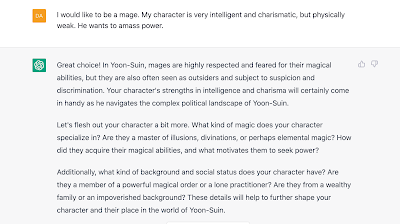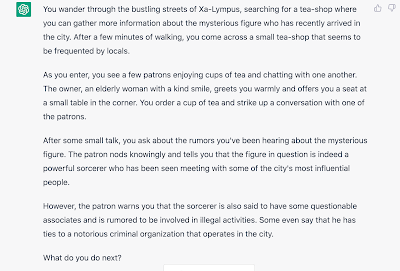Dan Sumption, a regular in my weekly campaign and all-round technical wizard (and quite possibly literal wizard - I really wouldn't be surprised) has been messing around with ChatGPT and trying to get it to DM a D&D campaign for him.
I thought I would also give it a go, on the basis that it's probably not fair to dismiss something as Satanic without having tried it. (Though, interestingly, nobody ever says this about human sacrifice or orgies with goats.)
So I went on over to ChatGPT and, after a while fooling around trying to get it to say outrageous things (annoyingly, it considers discussions about willies and bottoms to be offensive), I sat down to work.
Yes, it seems to 'know' what Yoon-Suin is - which I won't deny is flattering, and instantly earns it 1 not-Satan point. The strike against it (and this is a theme to which we will continually return) is that, rather than really presenting me with a role-playing game as such, the AI seems to interpret the exercise as being one of wish-fulfilment - 'Who do you want to be?' rather than 'Who do the dice say you are?'
I instantly deduct the not-Satan point I awarded ChatGPT in the previous round. Mages in Yoon-Suin are not seen as outsiders and subject to suspicion and discrimination. Has it just pulled this from a generic description of magic-users in other RPGs and settings?
And we continue with the wish-fulfilment vibe. The AI gave me lots of leeway. It definitely seems to have drunk the 'new school' Kool-Aid, with 'playing an RPG' understood to mean 'imagining I am somebody I would like to be'.
But let's go with it:
The AI, as will be apparent, likes to lay it on a bit thick with the flattery - one might almost say in a Satanic way. Xa-Lympus doesn't sound at all like a Yoon-Suinish name, but maybe that's a nitpick. The real issue is that one can already smell a railroad. I suppose I'll be investigating this sorcerer fellow then. Sigh.
This is beginning to read like a Fighting Fantasy gamebook. I don't really care about the sorcerer or his questionable associates and am beginning to feel like I feel when actually playing D&D with a railroady DM - impatient and filled with a perverse desire to be a fly in the ointment.
Let's see if I can shift the gears somewhat and imply I want to get on the right side of this sorcerer fellow. Let's also see if the AI can do real-world D&D style awkward, unrealistic flirtation:
I don't know about you, but by this point I had already twigged that basically my responses were simply cueing the AI to spit out a vaguely appropriate-seeming sequence of events, and this instantly drained the exercise of any real interest as a 'game'. But I decided to test the limits of the exercise:
See? I've said he's suspicious so he does suspicious things. Let's continue.
Yeah - I've said he's in cahoots with the sorcerer and, hey presto!, it turns out he is. The only reason to continue now is to see what happens when I decide to be silly.
Yes, it really did accept that I just happened to have a 'ring of villain vanquishment', although it also obstinately still wanted to keep me on the railroad. A climactic fight must be had, come what may!
OK, a fart joke is weak sauce indeed, but the response serves to illustrate the wider point, which is that the AI's 'DMing' style is a curious mixture of giving you whatever you want while also quite severely constraining you to what it considers to be appropriate. I decided to engage it in some slightly more philosophical questions, to which it responded in very anodyne fashion:
So there you have it. It is rather fascinating that it 'knew' about the quantum ogre. And, of course, in its own way it is deeply impressive that a chatbot can take a reasonable stab at DMing a session of D&D.
But at the same time, I found the manner in which it did so reassuringly crap. I had some fun messing around with ChatGPT, but only in the sense that I was curious to see what it came up with and academically interested in the results. There is no way this thing is even remotely in a position to do anything that involves actual intelligence - and this confirms my view that the phrase 'artificial intelligence' is itself woefully misleading. There is no intelligence on display here. Just the workings of a very complex automaton. We're in no danger at all of outmoding ourselves on this evidence.
The other point of interest, I suppose, is that the exercise confirms that for an RPG session to be successful it needs to involve give and take between DM and players. The DM can't just give the players whatever they want and present events in a manner which suits their desires - because that rapidly makes them bored. But at the same time the players need to be given a satisfactory level of agency: 'I guess we'll be investigating this sorcerer then' is equally as boring as 'you can be whoever you want and do whatever you want!' Further grist for the OSR mill, methinks.




















